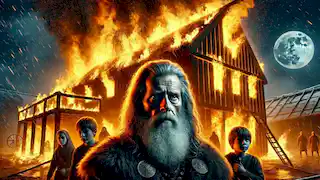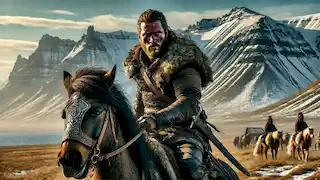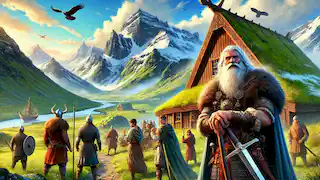Once upon a time in the land of ice and fire, Iceland, there lived a man named Njál Þorgeirsson. Njál was not an ordinary man; he was wise and known for his unmatched knowledge of the law. His home was in Bergþórshvoll, where he lived with his wife, Bergþóra, and their children. This story chronicles the events that befell Njál and his close friend, Gunnar Hámundarson, whose friendship was tested by the cruel hands of fate and the rigidity of ancient Icelandic law.
Njál’s wisdom was revered across the land, and his home became a haven for those seeking counsel. Gunnar, a formidable warrior known for his bravery and prowess in battle, often sought Njál's advice. Despite their contrasting natures, Gunnar’s valor and Njál’s wisdom created a powerful bond between them. Gunnar’s skills in combat were unparalleled, earning him the admiration and envy of many, while Njál’s sagacity made him a respected figure in their society.
The saga begins with an eventful journey Gunnar undertakes to Norway. During his voyage, he encounters Hallgerðr Höskuldsdóttir, a strikingly beautiful woman with a reputation for mischief. Despite Njál's warnings about her troublesome nature, Gunnar is enchanted and marries her. This union sets off a series of conflicts, as Hallgerðr’s vindictive personality clashes with those around her.
Hallgerðr’s beauty was only matched by her cunning. Her eyes, like glimmering jewels, hid a tempestuous spirit. Gunnar was captivated by her, believing he could tame her wild nature. However, Njál’s foresight saw the potential for discord. He advised Gunnar to consider the consequences, but Gunnar, driven by love and desire, ignored the warnings. The wedding was a grand affair, filled with feasting and celebration, yet beneath the surface, tensions simmered.

One fateful day, Gunnar finds himself entangled in a blood feud with Otkell Skarfsson, a local chieftain. Otkell's livestock had wandered into Gunnar’s fields, and Gunnar, in his anger, struck Otkell, causing him serious injury. Despite Njál’s counsel to seek reconciliation, the incident escalates, culminating in a series of retaliatory attacks that lead to Otkell’s death at Gunnar’s hands. This act of violence places Gunnar at odds with the law, and he is declared an outlaw.
As an outlaw, Gunnar is forced to leave Iceland, but his loyalty to his homeland and love for his family compel him to stay. His defiance of the law only serves to intensify the enmity against him. Njál, torn between his loyalty to Gunnar and his commitment to the law, attempts to mediate, but the cycle of vengeance proves relentless.
Gunnar’s defiance was a double-edged sword. On one hand, it showcased his bravery and unyielding spirit, but on the other, it drew the ire of his enemies. Hallgerðr, ever the provocateur, fueled the fire with her schemes. She persuaded Gunnar to raid Otkell’s lands, stealing livestock and goods. This act of theft further enraged Otkell’s kin, leading to a chain of retaliatory strikes.
The feud spiraled out of control. Blood was spilled on both sides, and each act of violence demanded retribution. Njál’s attempts to broker peace were thwarted by the stubbornness of the warring factions. The law, which Njál revered, seemed powerless against the tide of vengeance.
Hallgerðr’s malicious nature further exacerbates the situation. She instigates conflicts with Njál’s family, resulting in a bitter feud between the two households. The feud reaches a tragic climax when Hallgerðr orchestrates the burning of Njál’s home, trapping Njál, Bergþóra, and their sons inside. As the flames engulf their home, Njál, ever the stoic, faces his fate with dignity, refusing to abandon his family.

The loss of Njál and his family marks a turning point in the saga. The blood feud that consumed them highlights the brutal nature of Icelandic society at the time, where honor and vengeance dictated the course of one’s life. The tragic end of Njál and his kin serves as a poignant reminder of the destructive power of vengeance.
In the aftermath, Kari Solmundarson, a close ally of Njál, vows to avenge their deaths. His quest for justice leads him across Iceland and beyond, facing numerous trials and tribulations. Kari’s relentless pursuit of vengeance ultimately brings him face to face with his enemies, culminating in a fierce battle where he exacts retribution for Njál’s demise.
Kari’s journey was fraught with danger. He traveled through harsh landscapes, enduring the biting cold and treacherous terrain. His heart was heavy with grief and anger, driving him forward. Along the way, he encountered allies and adversaries, each adding to the tapestry of his quest. The clashes were brutal, and Kari’s skills as a warrior were put to the test.
One of the most significant battles took place at the Althing, the great assembly of Iceland. Here, Kari faced off against the leaders of the opposing faction. The clash of steel and the cries of warriors filled the air, creating a chaotic symphony of conflict. Kari’s determination and skill eventually led him to victory, but it was a hollow triumph, as the cost of vengeance weighed heavily on his soul.

Amid the chaos and bloodshed, moments of reflection and redemption emerge. Kari, having fulfilled his vow, seeks to reconcile with the remaining members of his adversaries’ families. This act of reconciliation signifies a break from the cycle of vengeance, offering a glimmer of hope for a more peaceful future.
The process of reconciliation was not easy. It required humility and a willingness to forgive. Kari met with the families of those he had fought against, offering his hand in peace. These meetings were tense, filled with the ghosts of the past. However, slowly but surely, bridges were built, and the wounds began to heal. The acts of reconciliation were marked by ceremonies and feasts, where old enemies shared food and drink, symbolizing the end of their enmity.
The saga concludes with the legacy of Njál and his unwavering commitment to justice. His story, though marred by tragedy, continues to inspire those who seek wisdom and fairness. The enduring friendship between Njál and Gunnar, despite the trials they faced, remains a testament to the strength of loyalty and the enduring human spirit.
The echoes of Njál’s wisdom resonated throughout Iceland. His name became synonymous with justice and fairness. Gunnar, too, was remembered not just for his prowess in battle but for his loyalty and friendship. Their story was passed down through generations, a cautionary tale of the perils of vengeance and the value of wisdom.
{{{_522}}}
Njál's Saga stands as a monumental work in Icelandic literature, capturing the essence of the Viking Age with its intricate portrayal of human relationships, the interplay of law and honor, and the inexorable march of fate. The characters, brought to life through vivid storytelling, embody the virtues and vices that define humanity.
The saga's rich narrative, filled with dramatic encounters, legal battles, and poignant moments of reflection, invites readers to ponder the timeless themes of justice, loyalty, and the human condition. As the flames that consumed Njál’s home eventually died down, the legacy of his wisdom and the lessons of his life continued to burn brightly in the hearts of those who heard his story.
In the quiet moments after the battles had ceased, those who survived reflected on the events that had unfolded. The landscape of Iceland, with its rugged beauty, stood as a silent witness to the human dramas that played out upon it. The valleys and mountains echoed with the tales of heroism and tragedy, serving as a reminder of the frailty and resilience of the human spirit.
{{{_523}}}
And so, Njál’s Saga, with its intricate tapestry of love, betrayal, and redemption, remains an enduring testament to the power of storytelling. Through its timeless narrative, the saga offers a window into a world where honor and vengeance shaped the lives of those who lived by the sword and the law. As the echoes of Njál's wisdom resonate through the ages, his story serves as a beacon, guiding us through the complexities of human nature and the pursuit of justice.
In the years that followed, the story of Njál and Gunnar continued to be told around hearth fires and in the halls of chieftains. The lessons of their lives were interwoven with the history of Iceland, becoming part of the cultural fabric. The saga was not just a tale of the past but a living narrative that spoke to the values and struggles of the present.
The enduring legacy of Njál’s Saga lies in its ability to capture the essence of the human condition. It speaks to the eternal struggle between good and evil, the complexities of human relationships, and the pursuit of justice in an often unjust world. It reminds us that even in the face of overwhelming odds, wisdom and courage can prevail.
As we listen to the saga today, we are transported to a time of heroes and villains, of epic battles and quiet moments of reflection. The story of Njál and his family, of Gunnar and his unyielding spirit, continues to inspire and teach. It is a story that transcends time, a testament to the enduring power of human resilience and the pursuit of justice.
And so, the saga ends, but its echoes continue to resonate, reminding us of the lessons learned and the legacy left behind. The story of Njál’s Saga is a beacon that illuminates the path of wisdom and justice
, guiding us through the complexities of life with its timeless narrative.



















